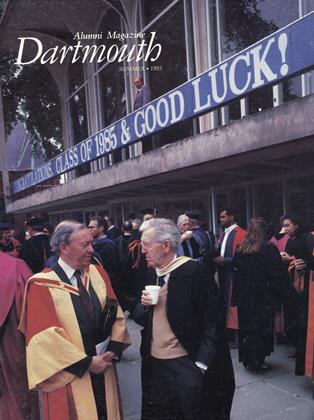It seems hard to believe that Commencement - my fourth at Dartmouth (three since I came back to Hanover and my own some 19 years earlier) - has come and gone. There is, of course, a certain sameness about them all, but each one has its own distinct aura that reflects the tenor of the times or at least the vagaries of the weather.
This year, there were more green armbands than I can recall seeing before. They were worn by a number of students and faculty to signify their opposition to the College's investments in the stock of corporations that do business in South Africa. The Trustees, who have tussled with the matter of divestiture for more than a decade, voted at their June session that only U.S. companies that are signatories to the Sullivan Principles by June 1986 will qualify for the College's endowment portfolio. It's not a radical step, yet it will undoubtedly cause a good deal of consternation among those on both ends of the divestment spectrum - and for all the obvious reasons.
The question of divestiture raises some fundamental issues about college administration in a private, liberal arts institution. Should a college, which is, after all, a corporation itself, make moral judgments about other corporations, particularly when those judgments take the form primarily of financial expression? Is there any real purpose served in cashing in the shares of one company for those of another? Shouldn't a college refuse donations from corporations whose activities are tainted in one way or another? And by extension, shouldn't a college refuse contributions from employees of those corporations? To paraphrase K ing Lear, this way madness lies. Yet to do nothing is to quote again from the play, nothing less than "an admirable evasion of whoremaster man."
President emeritus Kemeny said in a recent radio interview that he was generally opposed to taking stands on such political issues because they tended to divide his constituencies. It was something like embarking on an unwinnable war. President McLaughlin has acted cautiously himself, not so much to shield his administration from criticism, I suspect, as out of a sense that it's the most prudent course to steer in these turbulent times. Yet one need only consider the devastating effect the College's fairly equivocal stance on the Indian symbol has had on the Dartmouth body politic. And by comparison to the mindboggling prospect of nuclear winter or the depressing realities of life in subSaharan Africa, the Indian business should have been a breeze to resolve. I guess that's sort of a moral judgment on my own part. Godspeed, Mr. President, and, as John Sloan Dickey used to say at Convocation, "Good luck. We're with you all the way."
 View Full Issue
View Full Issue
More From This Issue
-
 Feature
FeatureA Humanist Ponders the Future of Liberal Education
June 1985 By Charles T. Wood -
 Feature
FeatureAn Apple on Every Desk
June 1985 By Fred Pfaff '85 -
 Feature
FeatureThe Great Train Robbery
June 1985 By Fred Pfaff '85 -
 Feature
FeatureThe Wentworth Bowl
June 1985 By Barbara J. MacAdam, Curator, Hood Museum of Art -
 Cover Story
Cover StoryValedictory Address
June 1985 -
 Feature
FeatureReunions 1985
June 1985 By Robert Frost
Douglas Greenwood
-
 Lettter from the Editor
Lettter from the EditorSettling in in Hanover
JUNE 1983 By Douglas Greenwood -
 Lettter from the Editor
Lettter from the Editor75 and Counting
OCTOBER, 1908 By Douglas Greenwood -
 Lettter from the Editor
Lettter from the EditorThe Fall of '63
November 1983 By Douglas Greenwood -
 Lettter from the Editor
Lettter from the EditorThe Real World
JUNE/JULY 1984 By Douglas Greenwood -
 Lettter from the Editor
Lettter from the EditorThe Place of Art
SEPTEMBER 1985 By Douglas Greenwood -
 Lettter from the Editor
Lettter from the EditorYou Can't Go Home, etc.
OCTOBER 1985 By Douglas Greenwood
Lettter from the Editor
-
 Lettter from the Editor
Lettter from the EditorREGARDING CLASS FUNDS
December, 1925 -
 Lettter from the Editor
Lettter from the EditorEditorial Comment
MARCH 1929 -
 Lettter from the Editor
Lettter from the EditorEditorial Comment
DECEMBER 1930 -
 Lettter from the Editor
Lettter from the EditorEditorial Comment
MARCH 1932 -
 Lettter from the Editor
Lettter from the Editor'Round the Girdled Earth
May 1943 -
 Lettter from the Editor
Lettter from the EditorThe Fall of '63
November 1983 By Douglas Greenwood

